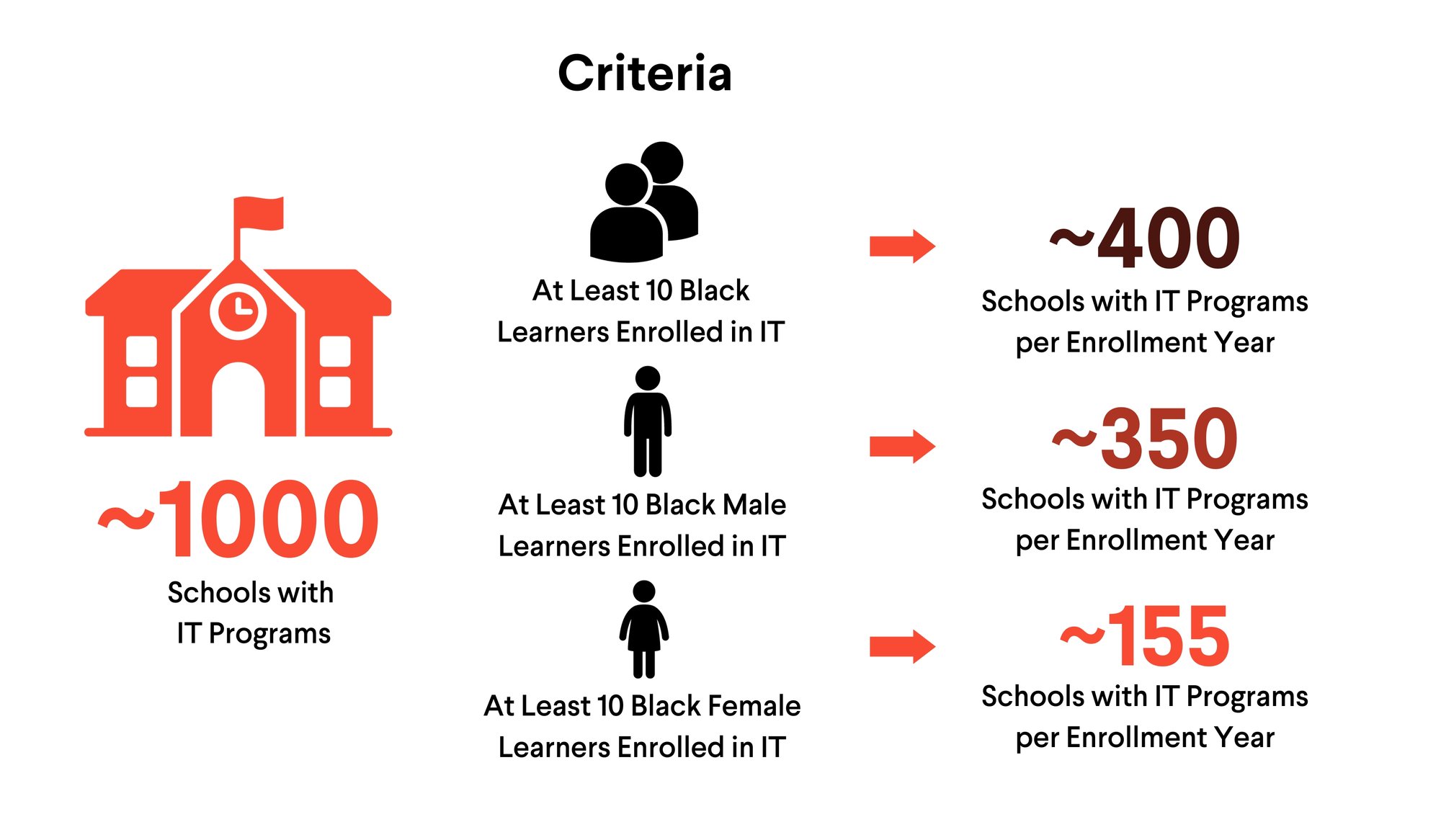JFF'S CENTER FOR RACIAL ECONOMIC EQUITY
Black Learners in IT Associate's Degree and Credential College Programs
Get the report sent to your inbox.
Introduction
Associate's degrees and credentials in Information Technology (IT) have the potential to open up high-wage and high-opportunity labor market opportunities for learners. Yet structural barriers in access to and completion of these degrees and credentials continue to make it difficult for Black learners and workers to access and thrive in these programs. These barriers contribute to the underrepresentation of Black learners and workers in the tech industry—a field that is projected to continue growing over time.
To learn more about opportunities and barriers along the pathways to tech careers for Black learners and workers, Jobs for the Future (JFF) conducted research exploring Black men’s and women’s enrollment and retention in, and completion of, postsecondary IT credential programs by institution and over time. In partnership with the National Student Clearinghouse (NSC) and with support from Capital One, we drew from several years of restricted-use NSC data to conduct this analysis. In addition, to learn more about how institutions are supporting Black learners in IT, we supplemented the quantitative data analysis with focus groups with administrators and faculty from five postsecondary institutions that demonstrated higher than average enrollment, retention, or completion by Black learners in technology programs.

Key Findings
Quantitative Analysis
Our research findings confirm that Black learner participation in associate's degree and credential IT programs across the country is limited.
- Out of the 1,000 postsecondary institutions that offer such programs, only 40% had at least 10 Black learners enrolled from 2017 to 2021.
-
- The number of programs with 10 Black men or 10 Black women is even smaller. Only 350 schools enrolled at least 10 Black men and only 150 enrolled at least 10 Black women.
-
- When we looked at new college enrollees into the IT program, we found fewer than 130 schools that had met this criterion.
- When we looked at new college enrollees into the IT program, we found fewer than 130 schools that had met this criterion.
- In addition, Black learner retention in and completion from these programs is also low.
-
-
Fall to fall retention, averaged across the five years, was only 38.6%, or nine learners per institution, while the six-year completion rate for a cohort of new Black learners starting an IT program in 2015 was only 12.9%, or three learners per institution.
-

Focus Groups
- From our focus groups, we learned that for most of the schools in our sample, race was not a significant or primary factor informing the development of strategies, policies, and programs to support learners. Rather, schools focused on other aspects of student need (socioeconomic, academic, social, emotional) through what could be called a “race-neutral” lens.
- While there were some noted exceptions to this—most prominently the acknowledged need for Black mentors and role models, especially Black men in IT, and more resources to reinforce such programs—race was not at the forefront of efforts to support students.
- When it came to women in IT, gender was also not a significant or prominent factor for policy or programmatic consideration.
- One exception to this was a school that used disaggregated institutional data by race and gender to identify Black student need and develop targeted institutional, financial, and classroom supports to address these needs.

Discussion
By not explicitly including Black men’s and women’s needs and perspectives in policies, initiatives, and strategies, postsecondary systems and institutions are less likely to disrupt systems that prevent Black learner success or to transform them into systems that can foster economic opportunity. Institutions and systems that intentionally identify and address roadblocks for Black learners may also build a foundation for improving outcomes for other students who are historically underserved by postsecondary education.
In addition, a structural approach to Black educational equity is likely more effective than the one-off program or strategy approach. Unlike one-time grant-funded programs, a structural approach is more likely to be tied to other institutional goals—and thus long-term funding, support, and accountability—with coordinated support across the campus from administrators, staff, and faculty.

Continued Research Opportunities
JFF views these findings as a call to action for the learn-and-work ecosystem to strengthen pathways to tech careers for Black learners to ensure they can succeed and advance in today’s digital economy. We are working with partners across education and workforce systems to build the evidence base for strategies that promote Black economic advancement. To build on what we have learned in this study, JFF is pursuing research in the following areas:
Black Learner Voice:
To ensure that colleges and IT programs are meeting the varied needs of Black learners, researchers need to hear directly from Black learners what their experiences are with the college and the program. This includes challenges and opportunities in enrolling in and completing IT programs and transitioning to other educational programs and employment.
Black Learner Pathways Through IT:
To identify barriers to enrollment, retention, and completion, research drawing from institutional data can be used to map where Black learners are progressing toward their educational goals and where they face roadblocks.
Ecology of Needs and Opportunities:
Community colleges are intimately connected to the communities in which they serve. Research on how to best support Black learners must include deep exploration of the social, economic, and cultural regional context within which Black learners live and work.
Making the ROI Case for Community Colleges:
Research that demonstrates the return on investments to the community from an equitable community college education system—and the tremendous costs to a community due to occupational segregation—can help colleges make the case for the funding they need to successfully support Black learners in high-growth pathways like IT.
About JFF's Center for Racial Economic Equity
The Center for Racial Economic Equity accelerates Black economic advancement by identifying solutions and best practices to disrupt occupational segregation and eradicate the Black-white wealth gap. For more information, visit https://www.jff.org/work/center-for-racial-economic-equity/.

Key Partners
JFF gratefully acknowledges our partners, supporters, and reviewers. The National Student Clearinghouse provided restricted-use data on student enrollment, retention, and completion of sub-baccalaureate degrees and credentials in IT programs and partnered with JFF on the identification of and outreach to institutions with higher-performing IT programs for Black learners. We are grateful to the college administrators, faculty, and staff who participated in focus groups for this study. Finally, we thank Capital One, whose support made this research possible.








